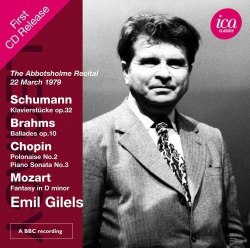|

|
Robert SCHUMANN (1810-1856)
Klavierstücke, Op.32 (1838-39) [12:47]
Johannes BRAHMS (1833-1897)
Ballades, Op.10 (1854) [26:04]
Fryderyk CHOPIN (1810-1849)
Polonaise No.2 in C minor, Op.40 [6:17]
Piano Sonata No.3 in B minor, Op.58 (1844) [29:52]
Wolfgang Amadeus MOZART (1756-1791)
Fantasy in D minor, K397 (1782 or 1786-87) [6:24]
Emil Gilels (piano)
rec. March 1979, Abbotsholme Arts Society, Abbotsholme School, Staffordshire, UK
ICA CLASSICS ICAC 5108 [81:35]
There are numerous live Gilels recitals from which to choose and maybe the fatigued collector, concerned about expense, and space, is right to pose the question: what’s so special about this one? Superficially, perhaps, not so much. It was recorded during a 1979 British tour at Abbotsholme School, Staffordshire, which had a fine track record in hosting eminent musicians. The repertoire was nothing out of the ordinary. True, he came quite late to Schumann’s Klavierstücke, Op.32 first playing them in 1977 in Moscow, but the other works were pretty central to his repertoire. In addition he made recordings in the studio for DG of the Ballades and the Chopin Sonata and Polonaise. So, to re-pose the question: what, why, and how.
The ‘what’ perhaps partly centres on his very personal slant on the Klavierstücke. The Moscow recital preserved on Melodiya contains his first public performance of the set, and that is, digitally, preferable to this somewhat later performance. There are trifling fluffs in the Gigue in Abbotsholme but also some tempo slackening that slightly dilutes appreciation. Set against that there are the rich voicings cultivated in the Fughette to enjoy, even though he takes it, as a whole, rather slowly. The Brahms Ballades are nobly and darkly sustained, their personal narratives being evoked in powerfully concentrated fashion. Once again, differences abound in Gilels’ performances. Turn to Brilliant 92615, a 10-CD box devoted to many live performances, and you will find a 1977 recital that differs quite markedly in emphasis, weight and speed. Both enshrine tonal breadth, of course, of the kind that made Gilels so eminent an exponent of the composer’s music. There’s a powerfully charged central panel in the second Ballade, though it’s much slower than the Moscow recital. Full of texture and colour, and again slower, is the Intermezzo, whilst the concluding Ballade is magisterial but reflective, taken at a much more confiding and elastic tempo than the more tense one he took earlier in Moscow.
For me this Ballade selection is the recital highlight. It opens up vistas of possibilities as to ‘why’ - why an executant artist takes such different but still profoundly right-sounding interpretive decisions over relatively so short a space of time. That is not to decry the Chopin. The Sonata is once again significantly more expansive than his 1977 Moscow recital in the Brilliant box already mentioned. The most mesmerising playing is to be heard in the Largo where, warmer voiced and more richly pedalled than in Moscow, or at least more richly recorded, he plays with rare communicative control and with a cultivated refinement shorn of exaggeration. Such applies to the Polonaise as well. As an encore he plays Mozart’s Fantasy in G minor with serene touch and tonal gradation.
Perhaps in the end there is no absolute answer to the what, why and how of things. Gilels shows how acutely sensitive performance can be, how malleable interpretation can be, and how an artist’s perception of a myriad of small or larger details can incrementally shape the course of his performance. For Gilels’ many admirers that may well be reason enough to enjoy this excellent recital.
Jonathan Woolf
 |
 |
|



 All Nimbus reviews
All Nimbus reviews








